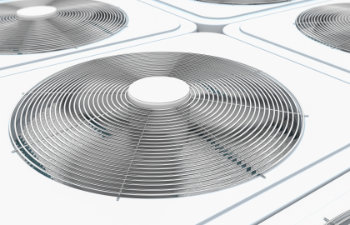
Living in Northern Georgia, you’re undoubtedly familiar with the infamous heat and humidity that can dominate our summers. As temperatures rise and the air becomes saturated with moisture, many homeowners may notice an increase in water production from their HVAC systems.
This phenomenon can be concerning, especially when water pools around the unit or begins to leak indoors. ClimateSmith LLC in Alpharetta explores why your HVAC unit produces excessive water and when to be concerned.
Understanding Your HVAC’s Water Production
HVAC systems, or Heating, Ventilation and Air Conditioning systems, are designed to regulate indoor air temperature and quality. One critical aspect of their operation involves removing humidity from the air.
When your air conditioning unit operates, it cools the air by passing it over chilled evaporator coils. During this process, moisture from the air condenses on the coils and drips into a drain pan, where it is then directed to the exterior through a drain line. In high temperatures and humidity, this process becomes more pronounced, and the volume of water produced can increase significantly.
Factors Contributing to Excess Water Production
Why are you seeing so much water near your outdoor HVAC unit?
- High Outdoor Humidity Levels: In Northern Georgia, humidity levels can reach uncomfortable highs during the summer months. When the humidity outside is too high, the HVAC unit must work harder to cool the air and remove moisture from it. This excess humidity can lead to more water condensation, especially if the unit isn’t adequately sized for your home.
- Poor Insulation: Homes that lack proper insulation or have leaks in their ductwork can allow warm, moist air to enter and mix with conditioned air. This leads to increased humidity levels inside the home and subsequently causes the HVAC system to generate more water as it tries to combat the excess moisture.
- Clogged Drain Line: Over time, dirt, debris and algae can accumulate in the condensate drain line, causing blockages. When this occurs, condensate water cannot drain properly, resulting in backups and excessive water production.
- Refrigerant Leaks: If your HVAC unit is low on refrigerant due to a leak, it can struggle to cool your home effectively. This inefficiency not only increases energy bills but can also result in more condensation forming on the evaporator coils, which subsequently leads to increased water drainage.
- Improperly Sized Unit: If your HVAC system is significantly oversized for your home, it will cycle on and off frequently without running long enough to effectively dehumidify the air. This can lead to excessive water production, as the unit doesn’t remove moisture adequately during its short cycles.
When Should You Be Concerned?
While some level of moisture production is normal for HVAC systems, there are signs that may indicate a problem:
- Water Leaking Indoors: If you notice water pooling around your HVAC unit or dripping from ceilings or walls, it may indicate a clogged drain line or other serious issues.
- Increased Humidity Indoors: If your house feels unusually humid or musty, even when the AC is running, this may indicate an ineffective dehumidification process.
- Frequent Maintenance Required: If you frequently troubleshoot your unit or notice a sudden change in system performance, it may be time to consult a professional.
About ClimateSmith LLC
At ClimateSmith LLC, we take pride in providing expert HVAC services to the residents of Atlanta, GA, and the surrounding areas. Our highly trained technicians understand the intricacies of HVAC systems and the environmental factors that influence their operation. We offer comprehensive diagnostics, installation, and maintenance services tailored to your home’s specific needs. We’re committed to ensuring that your HVAC system operates efficiently, providing comfort while also helping you save money on energy costs.
FAQs About Home HVAC Problems
Why is there water around my air conditioning unit?
Water can accumulate due to clogged drain lines, excessive humidity or a malfunctioning condensate pump. It’s essential to address the issue promptly to prevent water damage.
How can I reduce humidity in my home?
Consider using a dehumidifier, ensuring proper ventilation and maintaining your HVAC system. Regular maintenance and the use of exhaust fans can also help control humidity levels.
What should I do if my HVAC unit is leaking refrigerant?
Leaking refrigerant is a serious issue and should only be handled by a certified technician. Contact ClimateSmith LLC for an assessment and fix.
How often should I have my HVAC system serviced?
It’s best practice to schedule maintenance at least once a year, ideally before the hot summer months. This helps ensure your system is clean and operating efficiently.
Can poor insulation affect my HVAC system?
Yes, inadequate insulation can lead to increased energy costs and inefficiency in your HVAC system, resulting in excessive moisture and humidity problems.
Alpharetta GA Residential HVAC Service
While it’s normal for your HVAC unit to produce water — particularly in the height of Northern Georgia’s summer humidity — excessive moisture can be a sign of underlying problems. Regular maintenance and immediate attention to potential issues will keep your system running efficiently and extend its lifespan.
If you have any concerns or notice unusual water production from your HVAC system, don’t hesitate to reach out to ClimateSmith LLC for assistance.
Posted on behalf of
5190 Performance Dr
Cumming, GA 30040
Phone: (770) 475-9555
Email: contact@climatesmith.com
Mon - Fri
8:00am - 5:00pm





